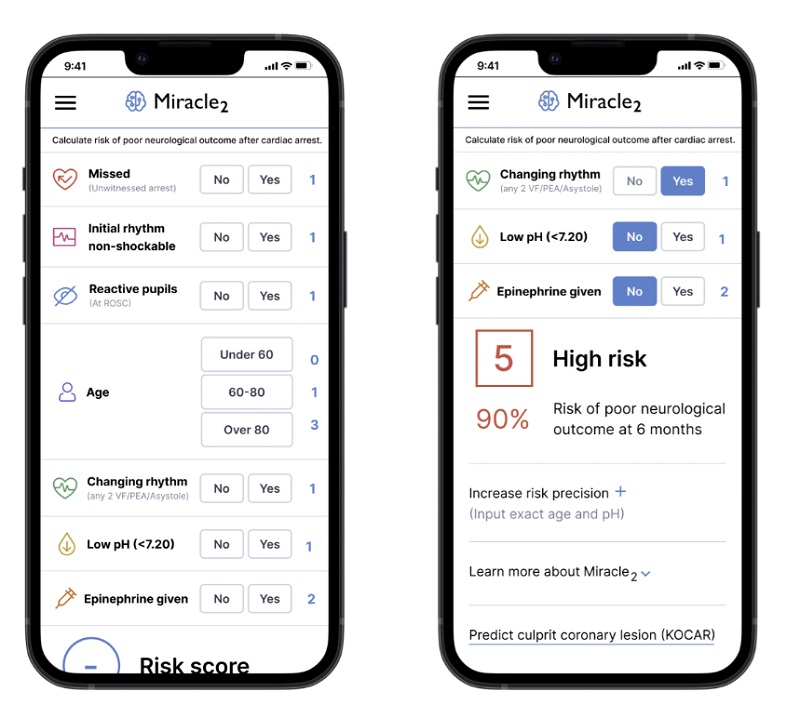Ensono Digital has worked with clinicians from King’s College Hospital (KCH) and King’s College London (KCL) to develop a new prototype application which will help paramedics and doctors effectively triage patients who suffer a cardiac arrest outside of a hospital.
Working together over three days at a Microsoft Hackathon, the team created a working prototype app to assess the risk of brain damage following an out-of-hospital cardiac arrest.
The app uses a neurological risk score from an algorithm known as MIRACLE2.
Healthcare professionals can use this information to personalise treatment to match the patient’s individual needs.
In the UK, the probability of surviving an out-of-hospital cardiac arrest is approximately 10%.
In comparison, in other countries, such as Denmark, this rate is as high as 20%.
Dr Nilesh Pareek, consultant interventional cardiologist at King’s College Hospital and adjunct senior lecturer at King’s College London, is spearheading work in the UK to address this problem, aiming to revolutionise treatment for patients.
He has organised a programme of research, funded by Heart Research UK, that resulted in the MIRACLE2 algorithm, which gives a neurological risk score that a cardiologist can easily apply to any patient based on a few simple features.
The app aims to make the MIRACLE2 algorithm accessible and useable for clinicians.
Patient data like age, ECG scores, and heart rhythm can be put into the software. The algorithm then takes this information and uses it to calculate a risk score for a poor neurological outcome.
The app remains in development and is not currently available for clinical use.
Over the three-day Microsoft Hackathon, the Ensono Digital team worked with academics from King’s College London to turn this ground-breaking initiative into an effective prototype.
In that critical first 72 hours after an incident, care currently looks very similar for most patients, potentially missing the chance for vital investigations into the wider impacts of cardiac arrests on the human body
The team designed an app that presented the predictive information from MIRACLE2 in a clear format that clinicians could use to make informed decisions in difficult situations.
The first step was to find a platform that could support the development of the app.
After this, the team focused on making the user journey simple and accessible so any user could engage with the algorithm easily and provide the best care solution based on the algorithm’s rankings.
The result was a proof-of-concept web application, delivered pro-bono by Ensono Digital.
The app is currently in development, but could in the future be used to support clinicians to make more-informed decisions on patient care
The next steps involve continuing development of the app, including circulating the tool with cardiologists at King’s College Hospital to get more user feedback.
Dr Pareek said: “For a long time, I have been concerned about the poor outcomes of out-of-hospital cardiac arrest.
“In that critical first 72 hours after an incident, care currently looks very similar for most patients, potentially missing the chance for vital investigations into the wider impacts of cardiac arrests on the human body.
“That is why this app, and its ability to personalise care for patients, is so exciting.
“It is there to potentially support the decision-making of every healthcare professional, from the paramedics who first treat a cardiac arrest patient to the clinicians who receive them at the hospital.
“Care in the future might be shaped to the patient’s needs: someone with a high risk of a poor neurological outcome, for example, might be treated with targeted and rapid intervention to reduce damage to the brain.
“Of course, there is more value we can add to the application, but we’re now one step closer to realising how this initiative can deliver better patient outcomes for the UK healthcare system.”
Steve Jones, engagement director at Ensono Digital, added: “We’re incredibly humbled to have been involved in such a meaningful project.
Seeing this work, which will help people through incredibly-challenging moments in their lives, reminds us of the real and positive impact that technology can have on making our world a better place
“Over the three days, we worked with Dr Pareek to move this from an idea to a tangible app – working alongside cardiologists, predictive modellers and statisticians to produce real-world results.
“We look forward to deepening this collaboration as we continue to develop the application and create a solution that has the potential to transform the delivery of care for cardiac arrest patients.”
And Sergio Carrilho, partner technology strategist at Microsoft, commented: “The development of prototypes like this is one of the reasons why we run our Hackathons.
“Seeing this work, which will help people through incredibly-challenging moments in their lives, reminds us of the real and positive impact that technology can have on making our world a better place.
“Microsoft is working across the globe to leverage technology and deliver better outcomes across all industries and we look forward to continuing this partnership and delivering a solution that can make a difference within healthcare, for patients and healthcare professionals alike.”




